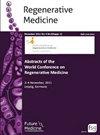十二烷基硫酸钠脱细胞对肝脏中糖胺聚糖含量的影响。
IF 2.4
4区 医学
Q4 CELL & TISSUE ENGINEERING
引用次数: 0
摘要
本文章由计算机程序翻译,如有差异,请以英文原文为准。
Effect of decellularization using sodium dodecyl sulfate on glycosaminoglycans content in the liver.
求助全文
通过发布文献求助,成功后即可免费获取论文全文。
去求助
来源期刊

Regenerative medicine
医学-工程:生物医学
CiteScore
4.20
自引率
3.70%
发文量
82
审稿时长
6-12 weeks
期刊介绍:
Regenerative medicine replaces or regenerates human cells, tissue or organs, to restore or establish normal function*. Since 2006, Regenerative Medicine has been at the forefront of publishing the very best papers and reviews covering the entire regenerative medicine sector. The journal focusses on the entire spectrum of approaches to regenerative medicine, including small molecule drugs, biologics, biomaterials and tissue engineering, and cell and gene therapies – it’s all about regeneration and not a specific platform technology. The journal’s scope encompasses all aspects of the sector ranging from discovery research, through to clinical development, through to commercialization. Regenerative Medicine uniquely supports this important area of biomedical science and healthcare by providing a peer-reviewed journal totally committed to publishing the very best regenerative medicine research, clinical translation and commercialization.
Regenerative Medicine provides a specialist forum to address the important challenges and advances in regenerative medicine, delivering this essential information in concise, clear and attractive article formats – vital to a rapidly growing, multidisciplinary and increasingly time-constrained community.
Despite substantial developments in our knowledge and understanding of regeneration, the field is still in its infancy. However, progress is accelerating. The next few decades will see the discovery and development of transformative therapies for patients, and in some cases, even cures. Regenerative Medicine will continue to provide a critical overview of these advances as they progress, undergo clinical trials, and eventually become mainstream medicine.
 求助内容:
求助内容: 应助结果提醒方式:
应助结果提醒方式:


